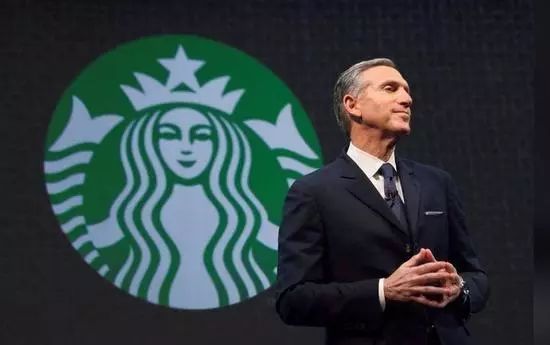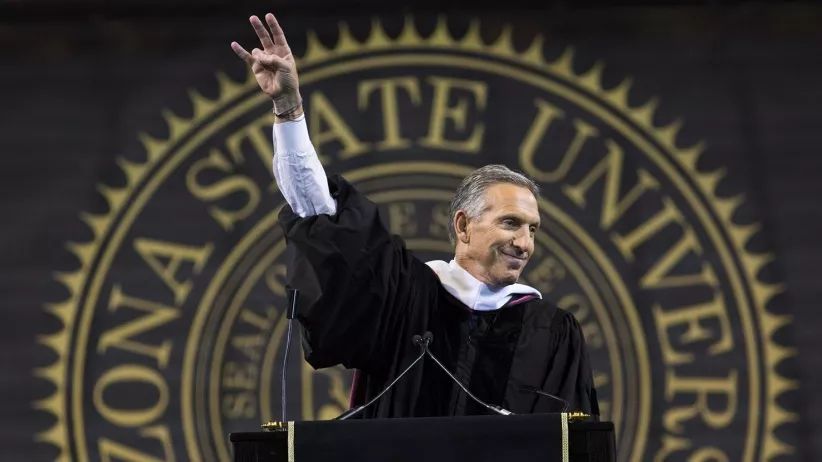"Star Dad" Schultz suddenly announced his resignation and may run for president of the United States?
Professional coffee knowledge exchange more coffee bean information please follow the coffee workshop (Wechat official account cafe_style)
"in your daily life, you will encounter all kinds of pressure from friends, family or colleagues to follow an easy path and follow a popular wisdom. If you don't want to simply accept the status quo and do what people expect you to do, it will be very difficult, however, when you really get it right-your heart, your dream-you feel sure, then you must do what can make your ideas come true. "
This is Schultz's interpretation of Starbucks' creation process.

Starbucks suddenly announced this morning that Starbucks Executive Chairman Howard Schultz (Howard Schultz) will formally bid farewell to Starbucks on June 26, 2018 and resign as Chairman of the Starbucks Board of Directors to serve as Honorary Chairman (chairman emeritus).
Starbucks board of directors nominated Myron Ullman, former chairman and CEO of retailer J.C. Penney, as Starbucks' new chairman, while Myron E. Ullman was appointed as the next chairman of Starbucks board, and Mellody Hobson was appointed vice chairman. Schultz will resign from the company and may go into politics in the future.
Some investors believe that Schultz's resignation from Starbucks indicates that he will go to politics. In fact, when Schultz privately presented his retirement plan to the board last year, people began to speculate that he was preparing for the 2020 U. S. presidential election.
Schultz is very popular with Starbucks. How does he write Starbucks Legend?
The one person Starbucks has to mention is the company's current chairman and CEO Howard Schultz, who has grown with the company on and off since the 1980s. But Starbucks was originally founded by three non-business people: Gordon Bowker (writer), Zev Siegl (history teacher) and Jerry Baldwin (English teacher). They wanted to bring the best coffee to Seattle, so they opened the first Starbucks in Park Market in 1971. At first only coffee beans were sold, but the addition of Howard Schultz made a difference.
(from left above: Starbucks founders Zev Siegl,Jerry Baldwin and Gordon Bowker)
An embarrassed childhood inspires dream-seeking ideals.
Schultz grew up in a slum on the East side of Brooklyn, New York. A family of five live in a small two-bedroom apartment, living on the meagre income of their father, a truck driver. When Schultz was seven years old, his father unfortunately broke his ankle at work. "my father has no medical insurance, no industrial injury compensation, nothing." Because of the loss of financial resources, the whole family began to live on borrowing.
(image above: Howard Schultz and his parents)
Living in poverty, Schultz began to make money when he was very young. he delivered newspapers by bike and worked in a restaurant. At the age of 16, he found a job working for a leather merchant in the garment district of Manhattan, a hard job that still leaves thick calluses on his thumb. He spent a hot summer in a sneaker store and steam treated yarns in a knitting factory.
To the young Schultz, his father was an unfortunate man: "he did all the blue-collar jobs, never earned $20,000 a year, and couldn't afford to own a house of his own." His father's tragedy inspired the young Schultz to pursue his dream: to build a company that creates happiness for employees.
Jieyuan Coffee joins Starbucks
Because of his excellent football skills, Schultz was admitted to the University of Northern Michigan in 1971 and realized his college dream by relying on a scholarship offered by the university. It was the same year that Starbucks was born in Seattle.
After graduating from college, Schultz returned to New York. He got a marketing job at Xerox and went to one of the best sales training schools in the United States. With hard work, he soon became a leader in the sales team and paid off the college tuition loan. Three years later, Schultz joined a Swedish company, became vice president and American branch manager, and bought his own house in Manhattan.
On a business trip, Schultz was attracted by hand-ground, freshly mixed coffee at the Starbucks Cafe in Seattle. He always remembers that the moment he pushed the door in front of the narrow store, a smell of coffee flowed out, bringing him into a wonderful hall.
"it was hard for almost everyone to understand why I gave up my high salary for this small coffee shop with only four branches, including my parents," Schultz explained. "when canned coffee powder was in vogue, only Starbucks sold freshly ground coffee." He believes that if you combine Italian romantic espresso production skills with freshly roasted coffee beans, it will bring this ancient product back to life and attract thousands of people. "this is the job that really grabs my heart and imagination."
In 1982, Schultz became the marketing and retail manager of Starbucks.
Jieyuan Coffee joins Starbucks
However, his experience at Starbucks did not go well. In 1985, Schultz left Starbucks and Schultz left Starbucks to start his own coffee shop: Il Giornale (Italian for "everyday") and Tiantian Coffee because he was at odds with his founder. During his two years away from Starbucks, he devoted himself wholeheartedly to Il Giornale, copying his understanding of Italian coffee culture to Il Giornale. Il Giornale quickly became popular among consumers. In 1987, Il Giornale acquired Starbucks, and Schultz became Starbucks CEO.
In August 1986, Schultz, who raised $750000 for Tiantian Coffee, got the news that Starbucks would be sold because of operational difficulties. In order to get his dream coffee shop, Schultz once again persuaded investors to scrape together the $3.8 million needed for his acquisition. On a sunny afternoon in 1987, Schultz took over Starbucks and became the actual helm.
Schultz came to Seattle to meet with Jerry Baldwin and Gordon Bowker, then owners of Starbucks. He was shocked by the founder's entrepreneurial passion and courage, because at the time, Starbucks was so small that it could only attract a small number of gourmets and coffee lovers.
If you join Starbucks at this time, you will not only have to change your job, but also face a sharp drop in income. But Schultz was convinced it was the right decision for him. It took him a year to persuade Baldwin to hire him as marketing director.
Later, Schultz said when he chose to leave, "if I hadn't done it then, I was just a sales manager, and Starbucks wouldn't be what it is today."
In 1987, Il Giornale took over Starbucks, and Schultz became Starbucks CEO. After buying Starbucks, Schultz led Starbucks to expand across the United States, and he first set his sights on Chicago. But because of the lack of cash on hand and over-optimistic market judgment, Starbucks was mired in the quagmire of Chicago. From 1987 to 1989, Starbucks lost $330000, $760000 and $12 million, respectively.
Three years after entering the Chicago market, locals began to like Starbucks' heavy-roasted coffee. Schultz turned things around by hiring experienced managers and raising prices to cope with rising rents and labor costs. In 1992, Starbucks had nearly 120 stores and was successfully listed on NASDAQ.
(image above: Starbucks went public in 1992)
Turn the tide and revive the chain empire
Starbucks is growing rapidly. In 2000, Starbucks opened 2600 stores in 13 countries around the world.
That year, Schultz resigned as CEO to become chairman of the board and global strategy officer. Chief financial officer Smith served as Starbucks CEO, Starbucks further accelerated the pace of global expansion.
Because of the rapid expansion and the depressed environment, Starbucks suffered its biggest crisis since its inception in 2007: consumption in more than 13,000 stores around the world fell to varying degrees, with a quarterly net loss of $6.7 million and its share price at an all-time low. Starbucks' investment in the infrastructure expansion of chain stores has exceeded the curve of corporate growth. Because the expansion is too rapid and even disorderly, Starbucks is also relatively rough in store design and lack of detail, and they begin to lose their once wonderful experience and romance. " Schultz could no longer be silent, and he went into battle again.
In an effort to cut costs, Starbucks closed nearly 1,000 stores between 2008 and 2009, cut the pace of global store opening by 30%, made modest layoffs, and Schultz himself applied to the board for a pay cut. With the recovery of the economic environment, Starbucks has successfully emerged from the quagmire of recession and turned losses into profits. Schultz continued to focus on the Chinese market and made a high-profile announcement in 2010 that he hoped China would become the second largest market after North America.
Today, Starbucks has opened more than 20000 stores worldwide. Among them, there are more than 2000 in Chinese mainland area. Starbucks' latest second-quarter results showed that global same-store sales rose 6 per cent to a net profit of $427 million, beating analysts' expectations of 5.4 per cent.
Schultz interprets the ideal with action. "if you devote yourself to your work, or anything worth working for, you will be able to realize dreams that others consider impossible, and life will become meaningful."
Schultz, 64, became Starbucks CEO in 1986, gradually turning Starbucks into a world-famous brand. Under his leadership, Starbucks grew from 11 stores to a super coffee empire with more than 28000 stores in 77 countries. So far this year, Schultz has worked for Starbucks for 36 years.
Eager to join "Starbucks" team → was rejected → became Starbucks Marketing Director → left Starbucks → to start his own coffee shop brand "Tiantian" → pooled money to acquire and transform Starbucks → into Starbucks CEO → to lead Starbucks globally.
Perseverance, never afraid of failure, this is the character gene of Schultz's success, he is a legend.

Howard Schultz Quotations
1. Life is often a series of mistakes. However, what we boil down to luck is not entirely out of luck in the final analysis. In fact, what you should do is to seize the present and take responsibility for your future. You have to have the spirit to face up to what people don't see and what the people involved can't catch-no matter who says no, stick to your path (if you're really sure, if you're sure). No great achievement is achieved by luck alone.
2. The ultimate measure of a man is not his position in good times, but how he stands when he is criticized and controversial.
3. If you want to build a great enterprise, you must have the courage to dream great dreams. If you only have a small dream, your success will not be great. For many people, maybe that's enough. But if your goal is to impress people, be brave. No matter what you can do, or what you are dreaming of. Just start doing it. Bravery includes talent, energy and magic.
4. Many of us have encountered such an emergency in our lives when your dreams are about to be dashed. You may not have expected this to happen, but how you react to it is crucial. It is important to remember your values: face it bravely, but also be fair. Don't give in. If the people around you have the same sense of integrity, you are sure to win.
I had no idea that running an enterprise would be so lonely and helpless. You can never say you want to quit, nor can you admit that you don't understand. When the company is still burning money, when you are faced with investors who have high expectations of you, when you suddenly find yourself responsible for hundreds of employees, when you are faced with difficult hiring decisions, that sense of frustration and anxiety is rarely shared for you. I have to find a balance between straightening out people's minds from intertwined relationships to creating complex development plans.
No one needs to reinvent himself more than a successful entrepreneur. One of the greatest responsibilities of an entrepreneur is to engrave his own values into the body of the enterprise. With the continuous growth of enterprises, the role of entrepreneurs will continue to evolve, from dreamers to entrepreneurs, then to professional managers, and finally to business leaders.
7. As a leader, one of the most basic principles is that when you are not very confident yourself, you must have the ability to instill confidence in others.
Source: Howard Schultz growth experience collected by Reuters, US website Business Insider
Howard Schultz quotes from the source "inject the heart"
Photo Source: Internet
Important Notice :
前街咖啡 FrontStreet Coffee has moved to new addredd:
FrontStreet Coffee Address: 315,Donghua East Road,GuangZhou
Tel:020 38364473
- Prev

Qianjie season ears 29.9 yuan 10 bags, candle, flower butterfly, Yemeni mocha limited time discount!
Professional coffee knowledge exchange more coffee bean information please follow the coffee workshop (Wechat official account cafe_style) Qianjie coffee in season, a box of ten packets 29.9 yuan national free delivery is not available! Are you done?! Are you done?! A box of ten packs, including 5 different flavors, costs only 29.9 yuan! Only 29.9 yuan! Only 29.9 yuan! Unlimited purchase to meet the two major coffees in Africa and the Americas
- Next

American media: Chinese young people promote coffee culture and the supply of hot coffee beans can hardly keep up!
Professional coffee knowledge exchange more coffee bean information follow coffee workshop (Wechat official account cafe_style) US media said that Starbucks recently revealed that it will open nearly 3000 new stores in China in the next five years, almost the same number as Starbucks currently has in China. According to a report on the CBS website on June 6, it is no secret that there is a lot of tea in China. However, for medium
Related
- Can lightly roasted coffee beans be used to extract espresso? How finely should you grind high-quality coffee beans to make Italian latte?
- What is the difference between the world's top rose summer coffee and Yejia Shefi? What are the flavor characteristics of Yega Shefi coffee and Panama rose summer?
- The ceremony is full! Starbucks starts to cut the ribbon at a complimentary coffee station?!
- A whole Michelin meal?! Lucky launches the new "Small Butter Apple Crispy Latte"
- Three tips for adjusting espresso on rainy days! Quickly find the right water temperature, powder, and grinding ratio for espresso!
- How much hot water does it take to brew hanging ear coffee? How does it taste best? Can hot water from the water dispenser be used to make ear drip coffee?
- What grade does Jamaica Blue Mountain No. 1 coffee belong to and how to drink it better? What is the highest grade of Blue Mountain coffee for coffee aristocrats?
- What are the flavor characteristics of the world-famous coffee Blue Mountain No. 1 Golden Mantelin? What are the characteristics of deep-roasted bitter coffee?
- Can I make coffee a second time in an Italian hand-brewed mocha pot? Why can't coffee be brewed several times like tea leaves?
- Hand-brewed coffee flows with a knife and a tornado. How to brew it? What is the proportion of grinding water and water temperature divided into?

